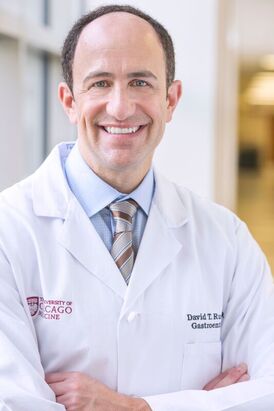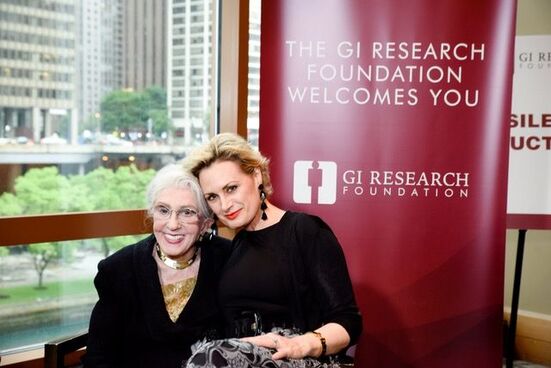January 2021 Featured Interview
|
|
Interview with
Katie Chudnovsky
First Female President of the Gastro-Intestinal Research Foundation
Photo Courtesy: GIRF
About Katie:
Yekaterina (“Katie”) Chudnovsky is an attorney, entrepreneur, philanthropist, investor, and president of the GI Research Foundation Board of Directors. She approaches both her career and life with dedication and empathy. She is General Counsel for a global technology firm and oversees intellectual property and mergers and acquisitions of start-up tech companies and technology development firms.
Katie began her legal career at Thomas Coburn, where she focused on corporate law, real estate, mergers and acquisitions, bankruptcy, and business banking. Born in the former Soviet Union, she and her family escaped Communism and made their way to the United States when she was five years-old. She graduated from Northwestern University with a B.A. in political science and Slavic literature and received her J.D. from DePaul University three years later.
She is passionate about and deeply involved in philanthropy. For the past seven years, she has served as a GI Research Foundation Board Member and, in 2019, Katie was named the first female President of the Board. She is also a strategic advisor of an innovative telehealth technology company, a Trustee of a private healthcare organization, and Board Member and investor of Vertiport, Chicago’s Helicopter Airport.
Katie is a mother of four and enjoys spending time with her family and teaching them the importance of giving back and helping others.
Katie began her legal career at Thomas Coburn, where she focused on corporate law, real estate, mergers and acquisitions, bankruptcy, and business banking. Born in the former Soviet Union, she and her family escaped Communism and made their way to the United States when she was five years-old. She graduated from Northwestern University with a B.A. in political science and Slavic literature and received her J.D. from DePaul University three years later.
She is passionate about and deeply involved in philanthropy. For the past seven years, she has served as a GI Research Foundation Board Member and, in 2019, Katie was named the first female President of the Board. She is also a strategic advisor of an innovative telehealth technology company, a Trustee of a private healthcare organization, and Board Member and investor of Vertiport, Chicago’s Helicopter Airport.
Katie is a mother of four and enjoys spending time with her family and teaching them the importance of giving back and helping others.
|
About Gastro-Intestinal Research Foundation (GIRF): The Gastro-Intestinal Research Foundation is a nonprofit (501c3) dedicated to raising funds to support the physicians and scientists at the Digestive Diseases Center at the University of Chicago Medicine. The University of Chicago GI Section treats digestive tract and related disorders, including inflammatory bowel disease, peptic ulcer disease, swallowing disorders, hepatitis and other liver diseases and transplantation, interventional endoscopy, pancreatic disease, celiac disease and nutrition disorders, including morbid obesity, pancreatic disorders, and colon cancer surveillance and chemoprevention.
|
|
Katie discusses her role as President of GIRF’s Board of Directors, the organization’s latest research and goals, and some of the challenges the nonprofit has faced during the coronavirus pandemic.
What does your role as president entail?
As President of the GIRF Board, I make sure our board and generous supporters know all of the important work our physician scientists are doing. Along with the executive committee and GIRF’s scientific advisors, I help steer the organization’s vision. I also sit on the ball committee and help plan our largest annual fundraiser.
My favorite role is helping direct our donations to support the unbelievable physician-scientists at the UChicago Medicine Digestive Diseases Center. At GIRF, we say ‘we have a front-row seat to groundbreaking science and discovery’ - and this is true! Recently, I was having a conversation with Dr. Michael Charlton, one of our scientific advisors, and he explained how he is using 3D printing as a revolutionary tool for diagnosing and treating liver diseases. I was in awe. And this is common at GIRF. We witness the direct line between an idea in a laboratory to a treatment that will ultimately transform someone’s life. I am proud to help lead an organization that is fueling life-changing discoveries.
What is the latest research that GIRF has funded?
This year we were all up against the global pandemic, professionally and personally. Fortunately, GIRF’s mission endured and enabled critical digestive diseases research to continue without interruption. We are funding a multitude of research projects and the investigators leading them, including early detection of pancreatic cancer; improving colonoscopy for colon cancer screening; the first mouse model of celiac disease - a breakthrough in understanding the disease; the relationship between IBD and anxiety/depression; expanding treatment options for patients with liver and bile duct cancer; and more.
GIRF funding has led to groundbreaking achievements by the renowned UChicago Medicine Digestive Diseases Center. Behind every innovation are countless lives that have been changed.
What does your role as president entail?
As President of the GIRF Board, I make sure our board and generous supporters know all of the important work our physician scientists are doing. Along with the executive committee and GIRF’s scientific advisors, I help steer the organization’s vision. I also sit on the ball committee and help plan our largest annual fundraiser.
My favorite role is helping direct our donations to support the unbelievable physician-scientists at the UChicago Medicine Digestive Diseases Center. At GIRF, we say ‘we have a front-row seat to groundbreaking science and discovery’ - and this is true! Recently, I was having a conversation with Dr. Michael Charlton, one of our scientific advisors, and he explained how he is using 3D printing as a revolutionary tool for diagnosing and treating liver diseases. I was in awe. And this is common at GIRF. We witness the direct line between an idea in a laboratory to a treatment that will ultimately transform someone’s life. I am proud to help lead an organization that is fueling life-changing discoveries.
What is the latest research that GIRF has funded?
This year we were all up against the global pandemic, professionally and personally. Fortunately, GIRF’s mission endured and enabled critical digestive diseases research to continue without interruption. We are funding a multitude of research projects and the investigators leading them, including early detection of pancreatic cancer; improving colonoscopy for colon cancer screening; the first mouse model of celiac disease - a breakthrough in understanding the disease; the relationship between IBD and anxiety/depression; expanding treatment options for patients with liver and bile duct cancer; and more.
GIRF funding has led to groundbreaking achievements by the renowned UChicago Medicine Digestive Diseases Center. Behind every innovation are countless lives that have been changed.
|
How do stress and anxiety affect digestive health? Stress and anxiety are associated with a number of changes in the body, and one of those is changes to the functioning of the digestive tract. While this is a normal aspect of being human, this becomes a problem if a person is experiencing ongoing stress and anxiety. It is important to remember that stress and anxiety is not just about work, family, or travel plans, it can also be about the GI symptoms themselves (called GI-specific anxiety or stress). So, if you have a digestive illness, addressing stress and anxiety is very important to your GI symptoms and overall well-being. ~ Alyse Bedell, Ph.D., GI Health Psychologist & Assistant Professor of Psychiatry & Behavioral Neuroscience at the University of Chicago. |
- Exploring the use of intestinal microbiota transfer for digestive diseases.
- Funding a groundbreaking study to discover the cause of ulcerative colitis.
- Established international clinical trials leading to a cure for Hepatitis C.
- Investigating the circadian clock of the gut microbiome and impact on digestive function.
- Examining hereditary screening protocols as well as precision treatment and prevention of colorectal cancer.
- Studying tissue and microbiome changes in small bowel following j-pouch surgery.
- Developing breakthrough treatments for food allergies and to induce tolerance to gluten in patients with celiac.
|
GIRF's Lead Scientific Advisor, Dr. David T. Rubin
Photo Courtesy: GIRF |
Does the organization offer any resources in prevention?
This year GIRF launched Gut Instincts: Making Sense of it All - an educational webinar series featuring research updates and prevention and treatment options. The first webinar, COVID-19 and IBD: School, Work and Vaccines, featured GIRF’s lead scientific advisor, Dr. David T. Rubin. This quarterly series is designed to help patients manage and learn about their diseases. GIRF also publishes a monthly e-newsletter with digestive diseases information - from high-level research updates to patient success stories to gut-friendly recipes. What is the organization’s biggest goal for 2021? GIRF’s central goal each year is to raise as much as we can to prevent, treat, and cure digestive diseases. Everyone knows someone who struggles with digestive health - from daily inconveniences to fatal diagnoses - and we are dedicated to improving their lives. |
This year, we also hope to expand our audience beyond our local Chicago reach. Digestive diseases patients from all over the country come to UChicago Medicine for the groundbreaking treatments and outstanding patient care. Furthermore, GIRF-funded research, such as discovering the very first gene associated with Crohn’s, is changing the way physicians treat digestive diseases worldwide.
|
Bee Crain (left) and Jennifer Sutton-Brieva
Photo Courtesy: GIRF |
You must be proud to have been elected GIRF’s first female president. Were there other women who helped pave the way?
GIRF has a lot of history, and I am honored to be a part of it, especially as its first female president. In 2021, GIRF celebrates 60 years of supporting research at the UChicago Medicine Digestive Diseases Center. GIRF was founded by grateful patients and friends of the late Dr. Joseph B. Kirsner, who was a pioneer in gastroenterology. Today, we continue to be inspired by Dr. Kirsner’s vision - merging innovation with patient care. In the 1960s, a GIRF Women’s Board was founded, and for many years was very successful in supporting GIRFs mission. Ultimately, women joined the board, and today we have many passionate, professional female board members. Beatrice “Bee” Crain, a fellow board member, is turning 100 this year and has been on the main GIRF Board from the beginning. Bee is a true trailblazer and certainly helped pave the way for women in this organization and beyond. |
|
What are some of the biggest challenges that arose due to the global pandemic?
Like so many organizations, GIRF has navigated several challenges this year. Thanks to our wonderful donors and incredible partners at UChicago Medicine, we continued to advance GIRF’s mission. The GIRF Ball is our largest fundraiser, bringing together nearly 600 people and raising over $1 million annually. It is a big celebration that we all look forward to each year. This year we had to pivot to a virtual event. While the evening was very different, the GIRF Ball’s committee, board members, and staff put on an amazing event that exceeded expectations. More than 1,000 guests joined us from living rooms all over the country, and we raised $1.4 million. This year, the 60th GIRF Ball is on Saturday, May 1 and is once again virtual. With experience on our side, we are looking forward to another successful event. Although, we cannot wait to all be together in 2022. The physician-scientists and nurses at UChicago Medicine Digestive Diseases Center are at the heart of everything we do. This year, many were on the frontlines helping treat COVID-19 patients, while keeping their GI patients healthy and safe. We wanted to provide them with support during this very challenging year. Through a matching campaign, we raised more than $60,000 to help fund UChicago Medicine’s most urgent needs. |
Benefactor Sy Taxman and NBC Chicago's LeeAnn Trotter,
Emcees of the 2019 Ball Photo Courtesy: GIRF |
What accomplishment are you most proud of?
Teaching my four children the importance of hard work and dedication.
Where do you find sanctuary?
Walks on the beach.
Teaching my four children the importance of hard work and dedication.
Where do you find sanctuary?
Walks on the beach.






